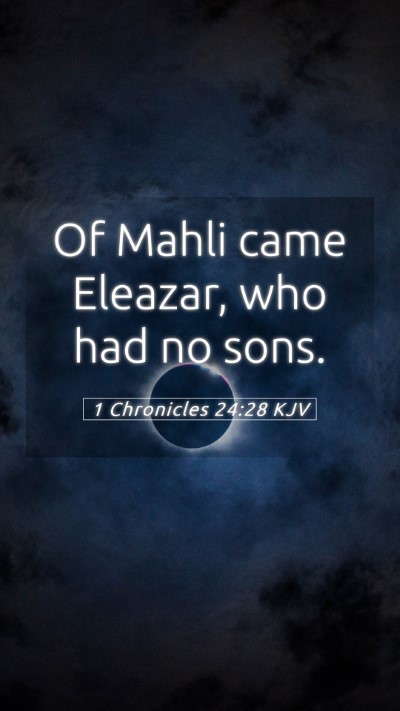Understanding 1 Chronicles 24:28
1 Chronicles 24:28 states: "and Ahijah was the leader of the family of Merari; he was a chief of all the sons of Merari. The family of Merari had the charge of all the instruments of the ministry in the tabernacle.". This verse plays a significant role in the understanding of the organization of the Levitical priesthood and their responsibilities in the service of God.
Bible Verse Meanings
This verse reflects the holiness and order within the worship practices of ancient Israel, as outlined in various public domain commentaries. The detailed categorization reinforces the concept that God’s work requires dedicated roles and proper arrangements.
Bible Verse Interpretations
Interpreters like Matthew Henry suggest that leaders within the priestly order were essential for maintaining the sanctity and order of religious practices. Albert Barnes notes that the familial organization underscores a sense of responsibility and the importance of heritage in serving the Lord. Meanwhile, Adam Clarke emphasizes the role of the Levites in guarding sacred objects, highlighting their importance in protecting vital elements of worship.
Bible Verse Understanding
The mention of Ahijah as a leader indicates that the roles were not merely functional; they involved a divine appointment, reflecting God's intention in ecclesiastical governance. This suggests a deeper theological implication regarding divine order and human responsibility.
Bible Verse Explanations
The verse clarifies the distribution of duties among the Levites, showing that each family had specific charges, which reflects the administrative aspect of service in the tabernacle. The organization highlighted by this verse reminds us that in any house of worship, duties should be assigned to ensure effective ministry.
Bible Verse Commentary
- Matthew Henry: Affirms the accountability that comes with leadership in the service of God, emphasizing that this structure was vital for the worship of the community.
- Albert Barnes: Points out the significance of Ahijah’s role and how it reflects the larger structure of the Levitical priesthood, ensuring that duties were clearly delineated.
- Adam Clarke: Discusses the Levites' charge over the instruments of the ministry, which in turn reflects on their responsibility to ensure respectful handling of sacred objects.
Scripture Analysis
1 Chronicles 24:28 is part of a larger passage that organizes the Levitical priesthood. This aligns with broader biblical themes regarding service, leadership, and worship. These themes provide a framework for understanding the expectations placed upon leaders and their duties in the house of God.
Biblical Exegesis
This verse can be examined through the lens of biblical exegesis by considering its historical context. The organization of the priests serves not only as a historical account but also as a pattern for today's church structures. The care with which these roles were designated implies a continuous divine relevance.
Bible Study Insights
When studying this verse, one can glean valuable insights into the nature of service in the community of faith. This aspect fosters discussions in bible study groups about how responsibility is vital within any structured ministry.
Cross References
- Exodus 28:1: Discusses the ordination of Aaron and his sons, establishing the priestly lineage.
- 1 Chronicles 23:27: Details the arrangement of the Levites and their responsibilities.
- Numbers 4:29-33: Outlines duties of the Merarites within the Tabernacle.
Conclusion
In conclusion, the verse serves to emphasize the careful and God-ordained structure within the ministry, illustrating how God values order and preparation in worship. For anyone looking for bible verse explanations or engaging in bible study materials, 1 Chronicles 24:28 provides a rich area for study and reflection.


